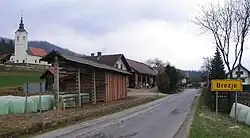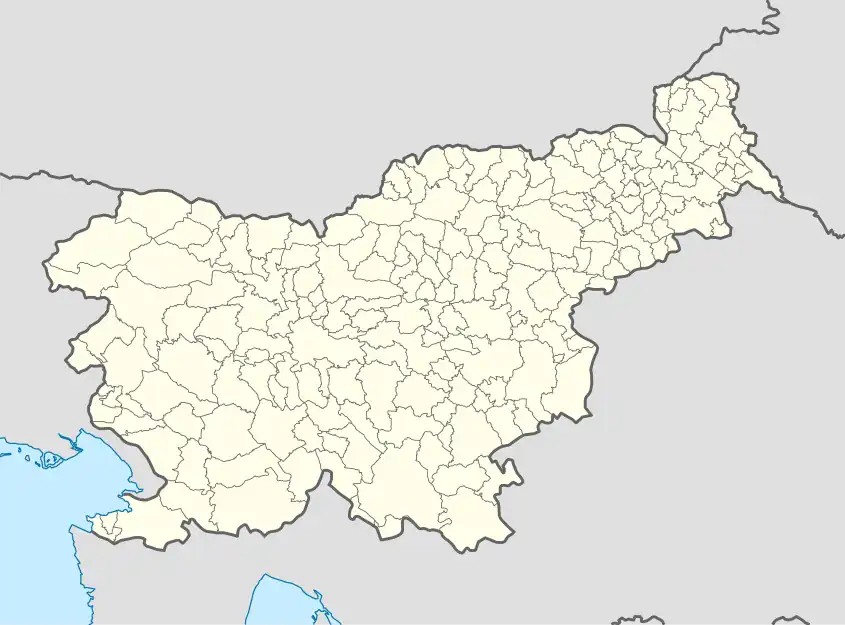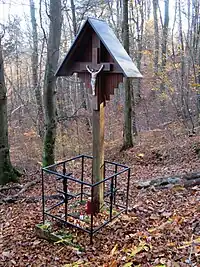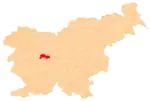Brezje pri Dobrovi | |
|---|---|
 | |
 Brezje pri Dobrovi Location in Slovenia | |
| Coordinates: 46°1′43.47″N 14°20′54.38″E / 46.0287417°N 14.3484389°E | |
| Country | |
| Traditional region | Upper Carniola |
| Statistical region | Central Slovenia |
| Municipality | Dobrova–Polhov Gradec |
| Government | |
| Area | |
| • Total | 6.82 km2 (2.63 sq mi) |
| Elevation | 339 m (1,112 ft) |
| Population (2020) | |
| • Total | 459 |
| • Density | 67/km2 (170/sq mi) |
| [1] | |
Brezje pri Dobrovi (pronounced [ˈbɾeːzjɛ pɾi ˈdoːbɾɔʋi]) is an elongated village in the Municipality of Dobrova–Polhov Gradec in the Upper Carniola region of Slovenia[2] on the road from Dobrova to Horjul. It lies on the somewhat elevated north side of the marshy valley of Horjulka Creek and it also includes the hamlet of Poljšno Brdo to the east of the main settlement. Ključ Hill (623 m) rises above the settlement to the north, and Strmca Hill (472 m) to the south.[3]
Name
Brezje pri Dobrovi was attested in written sources as Bresa in 1453, Bresye in 1490, Brassa in 1494, and Bresyach in 1496, among other spellings.[4] The name of the settlement was changed from Brezje to Brezje pri Dobrovi in 1953.[5] Brezje pri Dobrovi literally means 'Brezje near Dobrova'. The name Brezje is shared with several other places in Slovenia and is derived from the word brezje 'birch grove'.[6] In the past it was known as Bresie in German.[7]
History
A school was established in the village in 1911 in a private home, and a schoolhouse was built in 1928.[3]
On 12 May 1942 there was a pitched battle at nearby Ključ Hill between the Partisans and the Italians, during which the village came under fire, and was then burned on 13 May.[3]
Mass grave

Brezje pri Dobrovi is the site of two civilian mass graves from the Second World War. The Ključ 1 Mass Grave (Slovene: Grobišče na Ključu 1) and Ključ 2 Mass Grave (Grobišče na Ključu 2) are pits on the southern slope of Ključ Hill. Three sisters from the Skopec family of Stranska Vas, from the Glinar farm, were murdered and buried here by the Partisans on 28 April 1942 after the leadership of the Dolomite Detachment accused them of betrayal.[8][9][10]
Church
The church in Brezje pri Dobrovi was originally subordinate to the proto-parish of Šentvid nad Ljubljano. The church was assigned to Dobrova when it became a vicariate in 1723, and when Dobrova was elevated to a parish in 1784 it became part of that parish.[11]
The local church is dedicated to Saint Agnes.[12] The church was first mentioned in 1526. It was originally built in Gothic style, but was remodeled in Baroque style in 1729 and 1758.[3] The church is registered as a cultural monument.[13]
Cultural heritage
In addition to Saint Agnes' Church, Brezje pri Dobrovi has several structures registered as cultural heritage:
- The Polšno Brdo archaeological site is still largely unexplored. Roman-era pottery and construction material has been found here and an extensive field survey of the area was carried out in 2011.[14]
- The farm at Brezje pri Dobrovi no. 44 stands above the road into the settlement below the edge of the woods. It is an elongated single-story structure with a central entrance and a symmetrical gabled roof covered with concrete tiles. Alongside the gabled facade there is an outbuilding.[15]
- The house at Brezje pri Dobrovi no. 16 stands in the center of the village. This is a single-story rectangular structure, partially cellared, with a symmetrical gabled roof, incorporating both living quarters and an area for livestock. There is a central entryway from the courtyard and the year 1862 is carved into the black door casing.[16]
- The house at Brezje pri Dobrovi no. 17 stands in a clustered area of the village. This is a single-story rectangular structure with a part for livestock. The entryway has a semicircular door casing carved from black limestone, and the year 1886 is carved into the door casing of the livestock area.[17]
- An unnumbered house stands on the southwestern edge of the clustered part of the settlement, south of the church. It was numbered Brezje pri Dobrovi no. 1 in older documentation. This is a single-story rectangular structure with a central entrance and a large dormer above it. The year 1866 is carved into the richly decorated door casing. The facade is richly segmented with cornices and a soffit.[18]
- The Partisan Lodge on Ključ Hill was built in 1979 to commemorate members of the Dolomite Detachment. It contains a memorial room, and a plaque and dedication are attached to the structure.[19]
Notable people
Notable people that were born or lived in Brezje pri Dobrovi include:
- Janez Gregorin (1911–1942), pen name Igor Zagrenjen,[20] novella writer
References
- ↑ Statistical Office of the Republic of Slovenia
- ↑ Dobrova–Polhov Gradec municipal site Archived 16 January 2014 at the Wayback Machine
- 1 2 3 4 Savnik, Roman (1971). Krajevni leksikon Slovenije, vol. 2. Ljubljana: Državna založba Slovenije. p. 403.
- ↑ "Brezje pri Dobrovi". Slovenska historična topografija. ZRC SAZU Zgodovinski inštitut Milka Kosa. Retrieved 6 October 2021.
- ↑ Spremembe naselij 1948–95. 1996. Database. Ljubljana: Geografski inštitut ZRC SAZU, DZS.
- ↑ Snoj, Marko (2009). Etimološki slovar slovenskih zemljepisnih imen. Ljubljana: Modrijan. p. 79.
- ↑ Intelligenzblatt zur Laibacher Zeitung, no. 141. 24 November 1849, p. 20.
- ↑ Ferenc, Mitja (December 2009). "Grobišče na Ključu 1". Geopedia (in Slovenian). Ljubljana: Služba za vojna grobišča, Ministrstvo za delo, družino in socialne zadeve. Retrieved 22 October 2023.
- ↑ Ferenc, Mitja (December 2009). "Grobišče na Ključu 2". Geopedia (in Slovenian). Ljubljana: Služba za vojna grobišča, Ministrstvo za delo, družino in socialne zadeve. Retrieved 22 October 2023.
- ↑ "Odlok o Občinskem prostorskem načrtu Občine Dobrova - Polhov Gradec". Uradni list Republike Slovenije. 2019 (25). 19 April 2019. Retrieved 18 November 2023.
- ↑ "Marija v leščevju. Zgodovina božje poti in opis cerkve". Župnija Dobrova. Retrieved 4 June 2021.
- ↑ Šentjošt local tourist association site (in Slovene)
- ↑ Slovenian Ministry of Culture register of national heritage Archived 4 March 2016 at the Wayback Machine reference number ešd 1772
- ↑ Slovenian Ministry of Culture register of national heritage Archived 3 March 2016 at the Wayback Machine reference number ešd 29593
- ↑ Slovenian Ministry of Culture register of national heritage Archived 4 March 2016 at the Wayback Machine reference number ešd 17204
- ↑ Slovenian Ministry of Culture register of national heritage reference number ešd 17205
- ↑ Slovenian Ministry of Culture register of national heritage Archived 4 March 2016 at the Wayback Machine reference number ešd 17206
- ↑ Slovenian Ministry of Culture register of national heritage Archived 8 March 2016 at the Wayback Machine reference number ešd 17207
- ↑ Slovenian Ministry of Culture register of national heritage Archived 7 March 2016 at the Wayback Machine reference number ešd 5719
- ↑ Legiša, Lino, & Alfonz Gspan. 1971. Zgodovina slovenskega slovstva, vol. 7. Ljubljana: Slovenska Matica, p. 360.
External links
 Media related to Brezje pri Dobrovi at Wikimedia Commons
Media related to Brezje pri Dobrovi at Wikimedia Commons- Brezje pri Dobrovi on Geopedia
